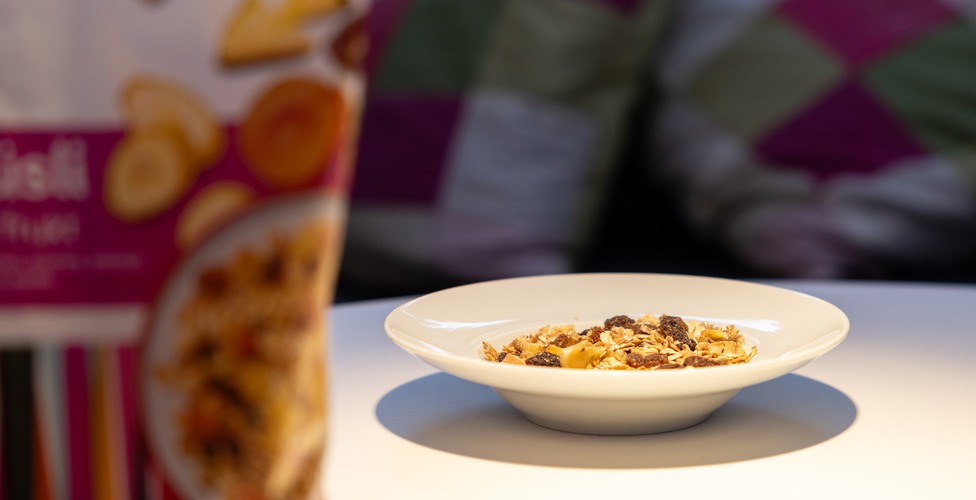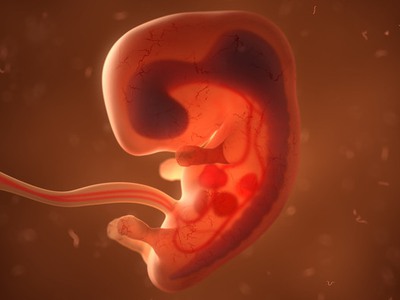On average, we consume 35 kg of sugar per person each year in Sweden, which is twice the amount we should be eating. Yet, we rarely receive help choosing healthy options in our stores. A new study from the University of Skövde shows how low-sugar muesli is hidden away in our supermarkets. In contrast, sugary muesli receives significantly better exposure and is advertised more often.

19 out of 24 muesli products studied contained too much sugar, and low-sugar muesli is often poorly displayed in our supermarkets.
When children and their parents first enter Willy Wonka's chocolate factory, they are greeted by a world of pure delight. Rivers of steaming hot chocolate flow by, surrounded by trees and bushes bursting with colourful sweets and sugary treats. It's a dream come true for the young visitors, and no one can resist the temptation.
The same mechanisms apply when we walk into our local grocery store and approach the muesli aisle. It is filled with sugary products that shout for our attention—placed at eye level, beautifully packaged, and strategically selected to tempt us into adding them to our carts. Just like the children in Roald Dahl's classic children’s book, it’s hard to resist.
Difficult to Find Healthier Options
A new study from the University of Skövde reveals that the majority of muesli products contain too much sugar. Out of a total of 24 muesli products studied, 19 contained 17 percent sugar or more, which is classified as too high. Additionally, the study found that the few products with low sugar content are difficult to locate on store shelves.
"Stores seem to want us consumers to buy high-sugar muesli products, as seen through recurring promotions," says Stefan Backe, Senior Lecturer in Public Health Science at the University of Skövde.
Economic Interests at Play
High sugar consumption increases the risk of type 2 diabetes, various types of cancer, and cardiovascular diseases. But why are high-sugar products highlighted at the expense of healthier options? Stefan Backe suggests it might be as simple as stores earning more from sugary products.
"It’s well-known that sugar triggers taste buds, which can lead to wanting more, so we buy more. However, this isn’t due to a reluctance on the part of store managers; they have actually expressed an interest in showcasing healthier products. Decisions are often made centrally, which complicates such changes."

Stefan Backe, Senior Lecturer in Public Health Science at the University of Skövde, hopes for political initiatives to help reduce our sugar consumption.
Sugar Tax as a Possible Solution
Stefan Backe hopes the results from the study can be used by consumer organisations to push producers to develop more low-sugar products. He also hopes political initiatives can be taken, mentioning a sugar tax as one example. Another possibility could be that policymakers at the EU level make decisions on a maximum limit for sugar content in our food.
"This is about public health and making it easier for consumers to choose healthier options. This is especially important for people with type 2 diabetes, but everyone benefits from more low-sugar products. It’s not just about muesli. Many common foods, like milk, yoghurt, jam, marmalade, ketchup, mustard, and juice, contain unnecessarily high amounts of sugar," says Stefan Backe.
More About the Study
The study was conducted in five different grocery stores in Helsingborg—City Gross, Hemköp, Ica Maxi, Stora Coop, and Willy’s. The results were published in the journal Health under the title: Type 2 Diabetes—Hard to Select a Healthy Choice.
World Diabetes Day - November 14
A UN-Day
On 14 November, World Diabetes Day highlights the millions of people worldwide who live with or are at risk of developing diabetes. The day was established in 1991 by the International Diabetes Federation and the World Health Organization to raise awareness of the magnitude of the problem. Since 2007, the UN has also supported efforts to combat this disease.
The number of people affected has risen from 108 million in 1980 to over 422 million today, with a particularly sharp increase in low- and middle-income countries. While diabetes can lead to severe complications, a healthy lifestyle can reduce the risk.
A Global Challenge
The UN views diabetes as a serious global health threat, which was formalised in a 2006 resolution. This makes diabetes the first non-communicable disease to receive this level of recognition. The UN’s goal is to encourage more countries to spread awareness about diabetes and work to halt its progression.
Why 14 November?
The date was chosen to honour Frederick Banting, born on this day, who was one of the researchers behind the life-saving discovery of insulin.




